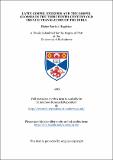Files in this item
Latin Gospel exegesis and the Gospel glosses in the thirteenth-century Old French translation of the Bible
Item metadata
| dc.contributor.advisor | Sneddon, Clive R. | |
| dc.contributor.author | Higgleton, Elaine Patricia | |
| dc.coverage.spatial | 2 v. [ix, 350, 693 p.] | en_US |
| dc.date.accessioned | 2018-06-15T13:55:55Z | |
| dc.date.available | 2018-06-15T13:55:55Z | |
| dc.date.issued | 1993-07 | |
| dc.identifier.uri | https://hdl.handle.net/10023/14126 | |
| dc.description.abstract | This thesis investigates an aspect of the first complete translation of the Bible into French. It shows how the study of the Gospels glosses, hitherto considered of secondary importance by scholars, increases our understanding of the date and context of this translation. This thesis takes two complementary approaches to the gloss material: (a) a study of the likely Latin sources for these glosses, and (b) an investigation into their recurring themes and rhetorical construction, as a way of showing how far they fit into the tradition of Latin exegesis. Chapter one surveys existing scholarship and presents the methodology of the thesis. Chapter two is a handlist of Latin commentaries consulted. In chapters three to six, the main body of the thesis, a comparison is made between Latin gloss material from these commentaries and corresponding glosses in the French Gospels, Chapter seven presents the broad patterns which have emerged from this study, discussing the use of material and rhetorical techniques, as well as identifying remaining problems, namely, those of other types of source-text, and the question of multiple translators. Chapter eight contains a summary of the conclusions reached, and discusses the implications of these for our knowledge of this Bible translation. The glossator is revealed as someone with access to exegesis from several different traditions, not just commentaries, and as a person trained in Latin commentary technique, which he adapted for writing in the vernacular. The glossator is shown not to have copied literally from commentaries or other texts, but to have used material thoughtfully, and reworked it for his own purposes. That the glossator was learned, and that his glosses fit into the Latin exegetical tradition, are the major findings of this thesis, challenging previously-held views as to the fundamental worthlessness of these glosses. | en_US |
| dc.language.iso | en | en_US |
| dc.publisher | University of St Andrews | |
| dc.subject.lcc | BS2555.3H5 | en |
| dc.subject.lcsh | Bible. Gospels--Criticism, interpretation, etc | en |
| dc.title | Latin Gospel exegesis and the Gospel glosses in the thirteenth-century Old French translation of the Bible | en_US |
| dc.type | Thesis | en_US |
| dc.contributor.sponsor | British Academy | en_US |
| dc.type.qualificationlevel | Doctoral | en_US |
| dc.type.qualificationname | PhD Doctor of Philosophy | en_US |
| dc.publisher.institution | The University of St Andrews | en_US |
This item appears in the following Collection(s)
Items in the St Andrews Research Repository are protected by copyright, with all rights reserved, unless otherwise indicated.

